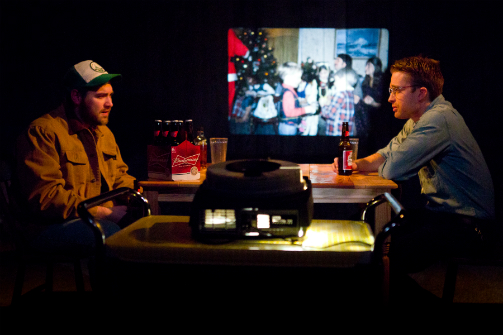
Spaces on the set of Brian Watkins's new play, Wyoming, are defined almost exclusively by tables -- bar tables, diner tables, kitchen tables, locations that often forge and sometimes force connections between people. Tables are just part of a range of everyday objects, including a locked box, a child's headphones, and a slide projector, that take on symbolic resonance in this meditation on time, choice, secrecy, and -- or perhaps through the lens of -- family. Wyoming, set primarily in the mid-'90s, centers on a Thanksgiving dinner during which the past of the particular family in question becomes unavoidable in various ways and for various, interwoven reasons. This breaking both of bread and of silences is directed by Danya Taymor, niece of the iconic Julie, and features original music from Robin Pecknold, of indie-folk powerhouse Fleet Foxes, and Neal Morgan that appropriately evokes a kind of windswept melancholy.
As the family -- three brothers, a sister and her child, and the siblings' mother -- ask or avoid questions, Wyoming asks about the "the rules" of telling (our) stories, the ways we do or don't communicate, what we choose to remember or forget, and the legacies of damage that families create. Its ambivalent coda reveals the presence of love to be important and powerful but far from a panacea. Love, like family, can be simultaneously beautiful and terrible. The mountains that come to frame the play suggest the sometimes imperceptible changes within the continuity of selves and generations. Both "dense" familial and geological time are ultimately outside the scope of any one individual’s perception; when the matriarch finally stops being able to identify her memories, her daughter and granddaughter are there to continue. Watkins explores these themes with dialog that impressively captures natural rhythms of conversation, including for perceptively drawn child Sarah. These naturalistic exchanges deftly handle exposition and, as evidenced by the laughter of the packed house, are often also very funny.
Tom (Daniel Abeles) and Grant (Nate Miller) have believable, entertaining chemistry as brothers, as do Maggie (Laura Ramadei) and Hank (Carter Hudson) as they boozily flirt their way in flashback to being lovers. Hudson brings the necessary rough charm to his role as the potentially abusive patriarch, and Ramadei meets the challenge of playing Maggie at several stages in her life. Layla Khoshnoudi convincingly creates a small child in everything from movement to intonation (which contrasts effectively with a late change), and Roger Lirtsman as Adam, the long-lost brother at the heart of the family’s silence about their father’s death, is remarkably expressive without saying anything for most of his time on stage. Finally, from her first appearance onstage, a colloquy with an unseen date, Sarah Sokolovic is unerringly superb as April, who steps in as the matriarch when her mother won’t, bringing her family together even though she may not have her own life in order. Her one-sided conversation with a new boyfriend subtly provides essential backstory, but it is the development of her character, flawed but deeply relatable and engaging, that makes the scene a centerpiece of the play. As Adam says, "maybe we’re all rotten in some way or another," and the fact that she has won the audience’s sympathy by the time that she shows some less savory aspects to her character, some of her particular legacy of damage, makes those later moments all the more sharply striking.
Stepping outside of the joint-reviewer voice: One of us was born in Wyoming, vacationed there as a child, and now has family in Cheyenne, where the majority of the play seems to be set, and so would add that Watkins clearly knows that part of the country and the people who live there. Fortunately, familiarity with the Equality State is not necessary to enjoy this play (Wyoming is the big square above Colorado!), and the family reunion arranged here by Watkins and Taymor is one well worth attending. - Leah Richards and John Ziegler
